In this edition of Court judgements review, we look at the Supreme Court’s judgement on relaxation of eligibility conditions, Punjab and Haryana High Court’s judgement on live-in relationships, Jammu and Kashmir High Court’s judgement on Preventive Detention Law, Orissa High Court’s judgements on ‘Dowry Demand’ and denial of service benefits during pendency of criminal trial.
Supreme Court: Though the state has power to relax the eligibility criteria, the same cannot be done mid-stream without giving wide publicity of such change.
The Apex Court, in Ankita Thakur & Ors vs. The HP Staff Selection Commission, remarked that the state must give enough publicity if the recruitment rules are modified. These are valid only if such alterations are specified in the rules or job advertisement.
The two-judge bench comprising of Justice Hrishikesh Roy and Justice Manoj Misra was hearing a batch of appeals against the judgement of the Himachal Pradesh High Court that upheld the State Government’s decision to relax eligibility requirements for the post of Junior Office Assistant (JOA). The reasoning by the High Court while upholding the said relaxation is that the earlier prescribed qualifications were vague and unclear.
As a result of the tweak in relaxations, the candidates initially deemed ineligible under the original rules were now considered eligible. This also resulted in candidates who, although lower in merit but eligible based on the original rules, being removed from the merit list.
Upon hearing the arguments from both parties, the apex court framed seven key issues.
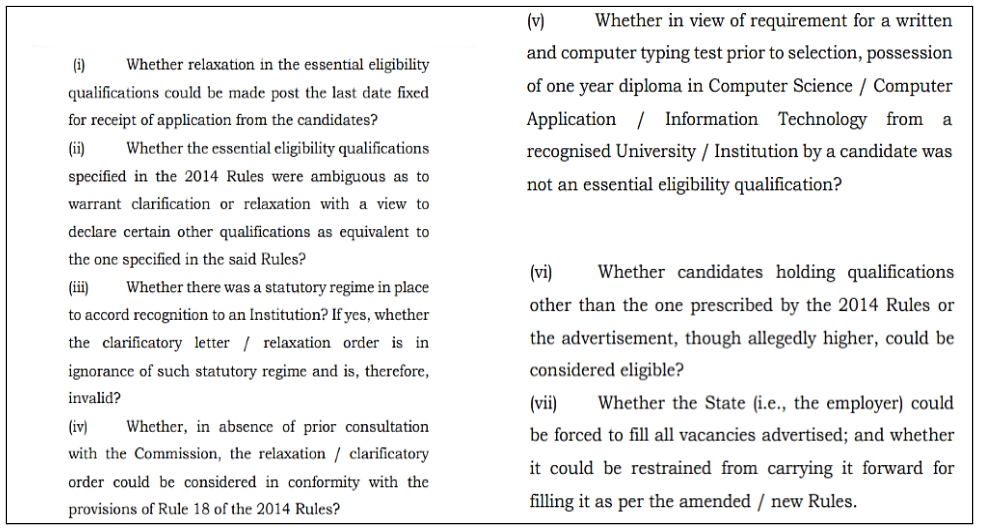
The court noted that there was no dispute on the below facts.
- That relaxation/clarification order was issued without consultation with the Himachal Pradesh Public Service Commission; and
- When the relaxation order was issued, the last date of receipt of applications had passed.
On the issue of whether the relaxation order could be made post the last date of receipt applications, the court held that if the existing Rules allow for the possibility of relaxing eligibility criteria, this authority can only be utilized if explicitly mentioned in the advertisement. Additionally, when this authority is exercised, there should be extensive publicity to ensure that individuals who might benefit from this relaxation are aware and can take the opportunity to apply and compete. This was not done in this case.
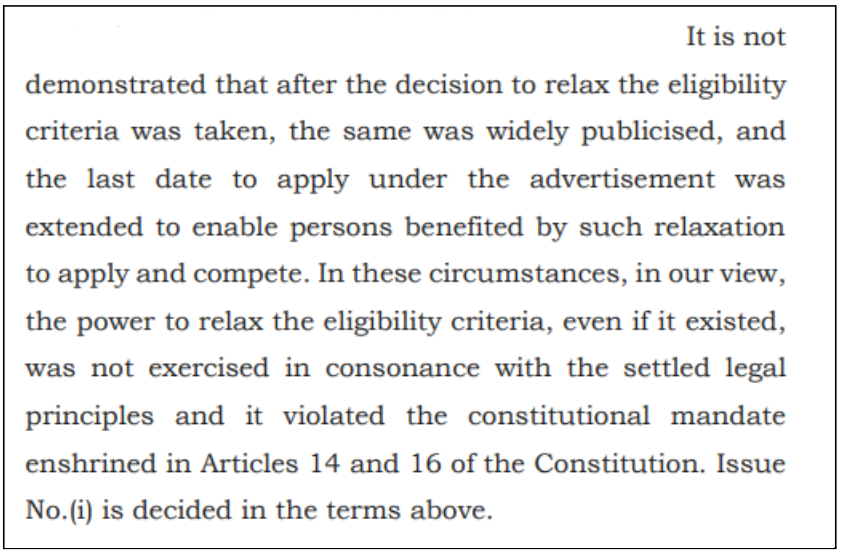
On issues (ii), (iii),(iv) – relating to the ambiguity in earlier eligibility qualifications, and prior consultation of the commission, the apex court relied on Bank of India vs. Aarya K Babu, where it was held that it was incumbent on the employer to issue a corrigendum incorporating the changes to the notification and invite application from those qualified as per the changed criteria and consider the same along with the applications received in response to the initial notification. It was not followed in this case.
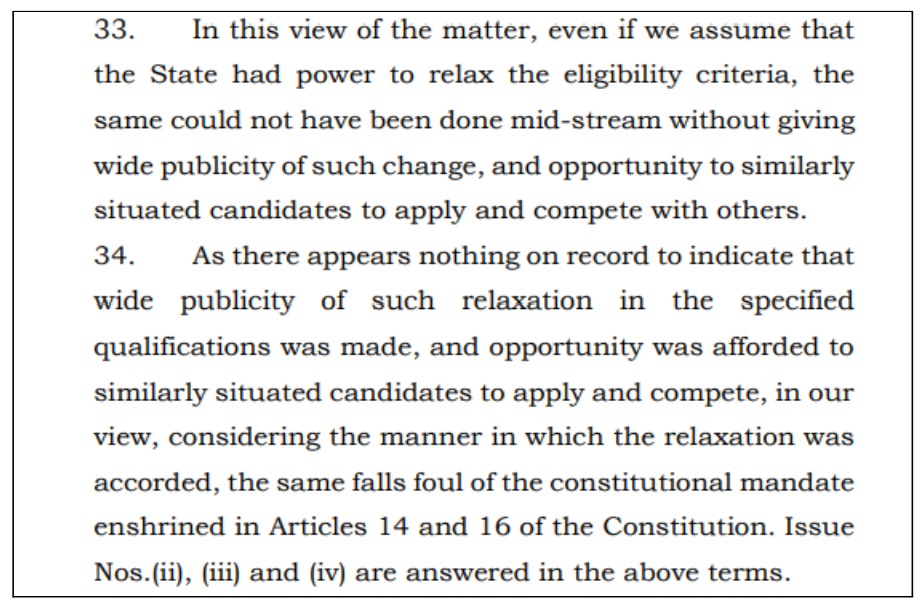
Further, on issues (v,) (vi), and (vii), the apex court held that the High Court rightly rejected the claim of such candidates, who could not demonstrate that they held the prescribed essential qualifications since there was no such provision in the rules earlier. Further, the apex court held that even a candidate included in the merit list has no indefeasible right to the appointment even if the vacancy exists.
Accordingly, the appeals are disposed of.
Punjab and Haryana HC: Live-in relationship without obtaining divorce is punishable under sections 494/495 of the IPC.
The Punjab and Haryana High Court, in Reena Devi & And. vs. State of Punjab & Ors, held that staying in a live-in relationship without obtaining any valid decree of divorce from his earlier spouse and during subsistence of his earlier marriage is a punishable offence under sections 494 and 495 of the IPC.
The single-judge bench of Justice Kuldeep Tiwari was hearing a writ petition to protect the lives and liberty of the petitioners. The petitioners claimed that they were both major adults and they both were living in a live-in relationship, which was accepted by the family members of one of the petitioners, while the other family did not approve of this. They further threatened to kill the petitioners, hence this petition to seek the protection of lives and liberty.
Looking at the facts of the case, the court found that one of the petitioners is unmarried while the other is married and has a daughter who is 2 years old. The married petitioner applied for a divorce in the family court and the matter is sub-judice. The court further held that without having a valid decree of divorce from an earlier marriage, the present relationship cannot be termed as ‘live-in relationship’ or relationship’ in the nature of marriage. Such acts are punishable under section 494 and 495 of the IPC, that deal with marrying again during a lifetime and concealment of a former marriage from the person with whom the subsequent marriage is contracted.
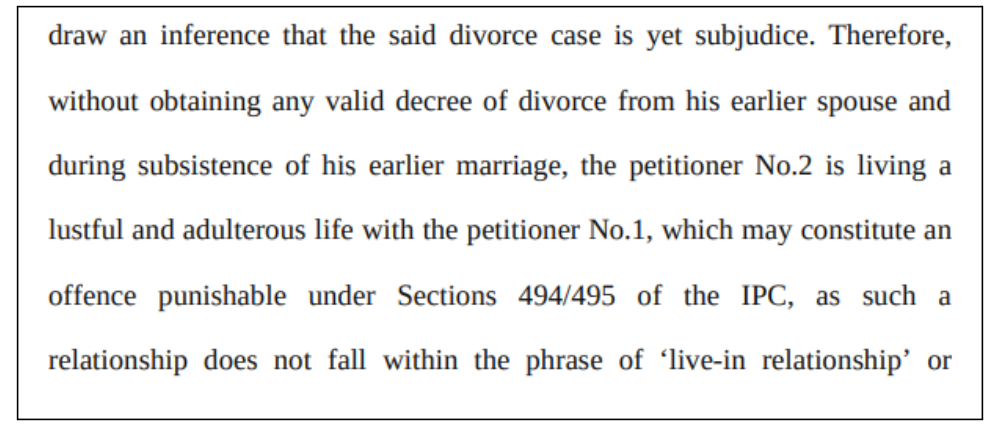
Further, the court remarked that the petitioners failed to provide any evidence to corroborate their allegations. Hence, such bald and vague allegations cannot be accepted by the court.
The court also pointed out that this petition is a trick to avoid any criminal prosecution in case of adultery, and the hidden intent of the petitioners is just to obliquely obtain the seal of this Court on their conduct, which is unacceptable. Accordingly, the petition is dismissed.
Jammu and Kashmir and Ladakh HC: Tendency of detaining authority to detain critics of government machinery is an abuse of preventive detention law.
The Jammu and Kashmir and Ladakh High Court, in Sajad Ahmad Dar vs. Union Territory of Jammu & Kashmir, criticized the authorities for misusing the preventive detention law to detain critics of policies of government machinery. Being a critic cannot be a ground for detention.
The two-judge bench comprising Chief Justice of the High Court and Justice M.A. Chowdhary was hearing a petition seeking the quashing of the detention order against the petitioner. The facts of the case are as follows. Dar, known by the pseudonym Sajad Gul, has been held in custody under the Jammu and Kashmir Public Safety Act since 16 January 2022. This detention was based on allegations from the detaining authorities asserting that his tweets and statements incited hostility and posed a threat to public order and the state’s security. It was argued that the detainee was apprehended by the police authorities without valid cause and unlawfully confined for an extended period. The respondents claimed that the petitioner utilized social media to agitate against government institutions, posted contentious tweets/statements, and, in their capacity as a journalist, stirred animosity through the Twitter account @SajadGul_ for malicious intentions.
Upon hearing both parties, the High Court held that the detention order, founded on such vague reasons, cannot be upheld. The detaining authority, prior to issuing the order, did not thoroughly consider the situation to form a personal judgment justifying the preventive detention of the individual, thus infringing upon their valuable and fundamental right to liberty, safeguarded under Article 21 of the Constitution of India.
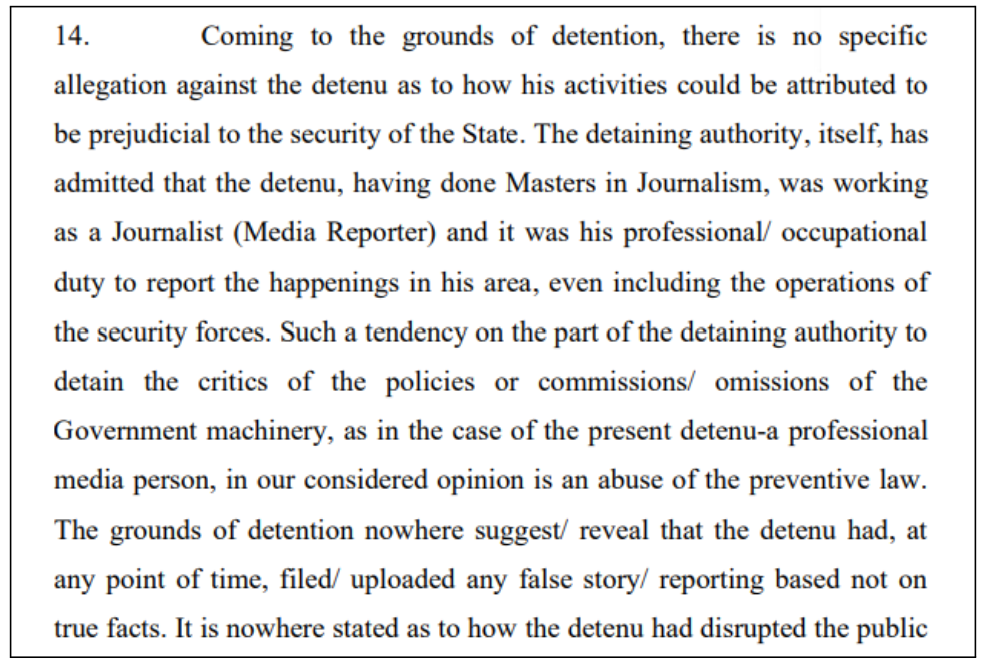
The court further found fault with the detention order, where no reason was specified, and such records on which the reliance was placed are not supplied. This effectively made the effective and meaningful representation unsustainable and is in contravention of the statutory provision of the J&K Public Safety Act as well as constitutional guarantees provided under Article 22 (5) of the Constitution of India.
Accordingly, the detention order is quashed.
Orissa HC: A demand for money on account of some financial stringency or for meeting some urgent domestic expenses cannot be termed as a demand for dowry as the said word is normally understood.
The Orissa High Court, in Bhanu Charan Pradhan vs. State of Odisha, remarked that a request for a sum by a husband with an assurance to repay does not amount to ‘dowry demand’ as per the definition of ‘dowry’ in Section 2 of the Dowry Prohibition Act, 1961.
The single-judge bench of Justice Sangam Kumar Sahoo was hearing an appeal concerning a person accused of murdering his wife related to a dowry demand. The charges against him included Sections 302/498A/304B of the IPC and Section 4 of the Dowry Prohibition Act. The trial Court convicted the appellant under Sections 498A/304B but acquitted him of the murder charge under Section 302 of the IPC. Unhappy with the conviction, the appellant appealed to the High Court.
The petitioner submitted that the basic ingredients to be proved to attract the offence under section 304-B of I.P.C. was absent in this case and since the relationship between the marital partners was cordial, it would also not attract 498A of the IPC.
Looking at the contentions of both parties, the High Court sought to know whether the ingredients of offence under section 304-B of the I.P.C. are fulfilled.
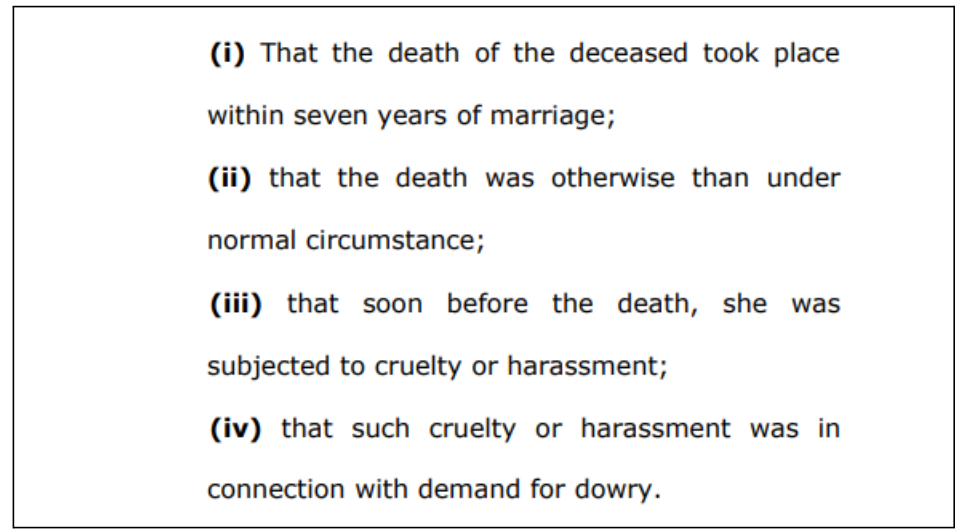
From the materials on the record, the court observed that the death took place within the stipulated seven years of marriage, and it agreed with the view of the trial court that the death of the deceased was otherwise than under normal circumstances. Furthermore, the court also finds that there is a cordial relationship between the marital partners.
It also further noted that there is no clinching evidence on record that soon before the death of the deceased, she was subjected to cruelty and harassment by the appellant in connection with any demand for dowry. Further, the demand for money with an assurance of repayment was not a dowry demand within section 2 of the dowry prohibition act.
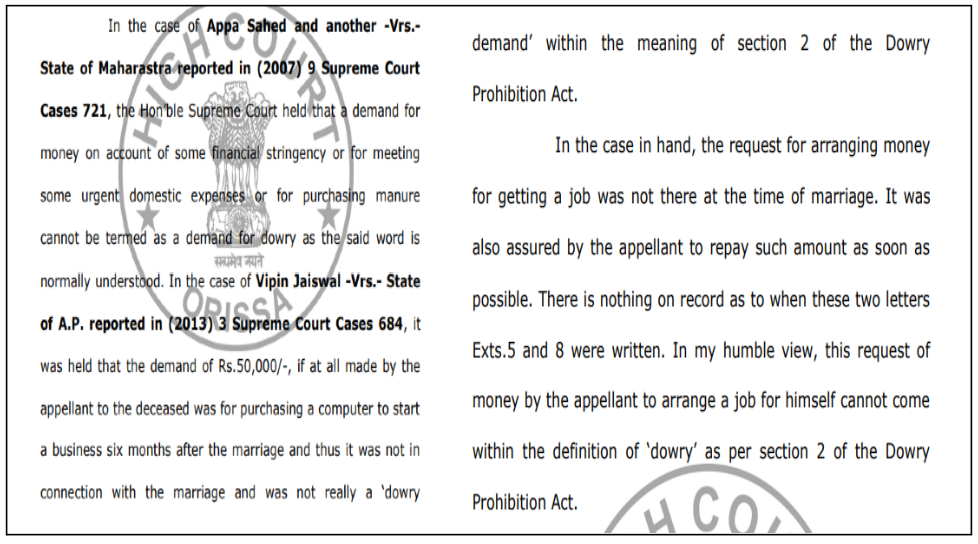
On whether the case had ingredients of section 498A, the court relied on the witnesses and the letter written by the deceased one week before the death. Accordingly, the court held that the appellant is liable to be punished under section 498A.
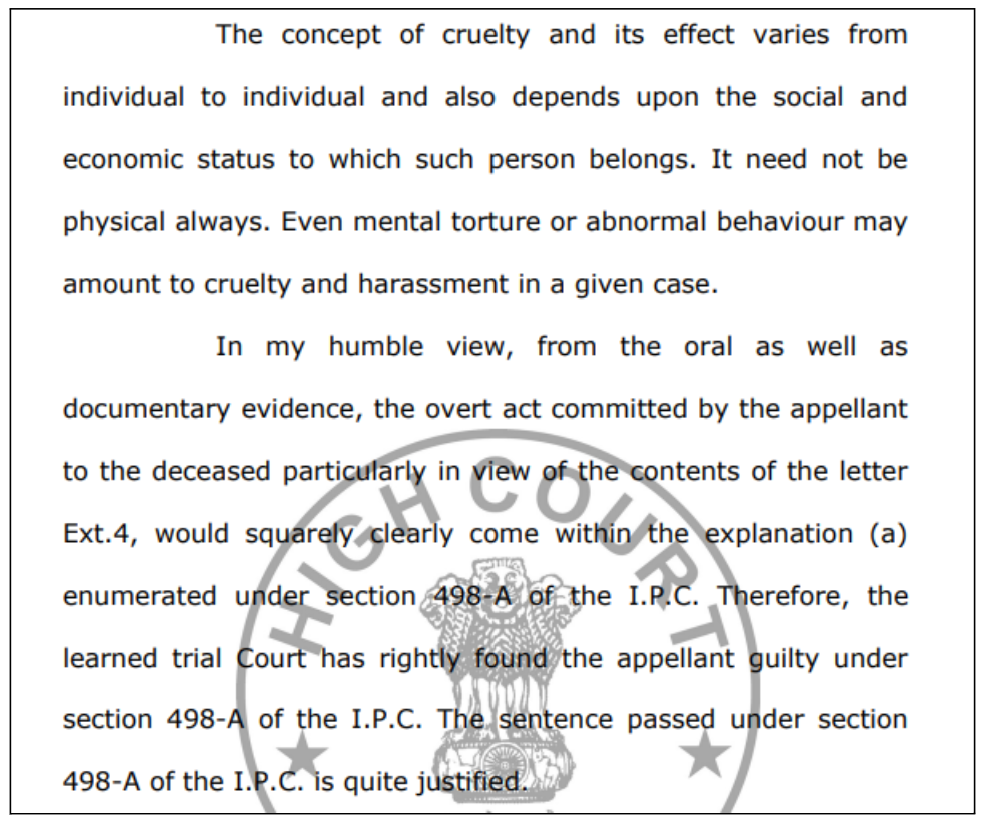
Accordingly, the conviction under section 304B is set aside and the conviction under section 498A is upheld.
Orissa HC: Unexplained prolongation of criminal trial violates the constitutional rights of an accused and denial of statutory or any other rights for a delinquent officer/government servant impending such delayed trial is indeed a case of double jeopardy.
The Orissa High Court, in Nihar Ranjan Choudhury vs. State of Odisha & Anr., held that the refusal to grant promotion and other lawful entitlements and work benefits solely due to the prolonged duration of a criminal trial constitutes a form of ‘double jeopardy’ and breaches the constitutional rights of the employee in question.
The Single Judge Bench of Justice Sibo Sankar Mishra was hearing a writ petition under Article 226 of the Constitution of India, among other things, seeking a writ against the Opposite Parties to be promoted to the positions of Deputy Executive Engineer, Executive Engineer, and Superintendent Engineer, retroactively from the time their immediate juniors received such promotions, and to receive all consequent service benefits. The Petitioner has been facing a criminal prosecution initiated in 2001, and despite the Departmental Promotion Committee (DPC) recommending their case for promotion, a sealed cover procedure has been enforced due to the ongoing criminal prosecution. Notably, no disciplinary proceedings have been initiated against the Petitioner by the department.
Following the initial decision by a Single Bench of the Court in response to the writ petition, which granted the petitioner’s requests for promotion while specifying that the promotion would be contingent upon the outcome of the ongoing criminal case, an intra-court writ appeal was filed. The Division Bench upheld the appeal, sending the matter back to the Single Bench and establishing specific deadlines for the submission of counter affidavits by the opposing parties and a rejoinder affidavit by the petitioner.
The State argued, citing the judgment in State of Odisha & Anr. vs. Joseph Barik, that the petitioner couldn’t be promoted with the outcome of the criminal case pending against them.
Upon hearing both parties, the single judge bench remarked that the judgement in Joseph Barik is different from the present case. In that case, the petitioners urged that at least they should have been granted ad hoc promotion awaiting the outcome of the criminal prosecution, however, in this case, the Petitioner is claiming promotion for which DPC has already recommended his case for promotion. However, it’s not given effect, and a sealed cover procedure has been adopted owing to the pendency of the criminal proceedings. It relied on Union of India and others vs. K.V. Jankiraman and others, where it was held that mere pendency of criminal case cannot be taken as a ground to delay promotion.
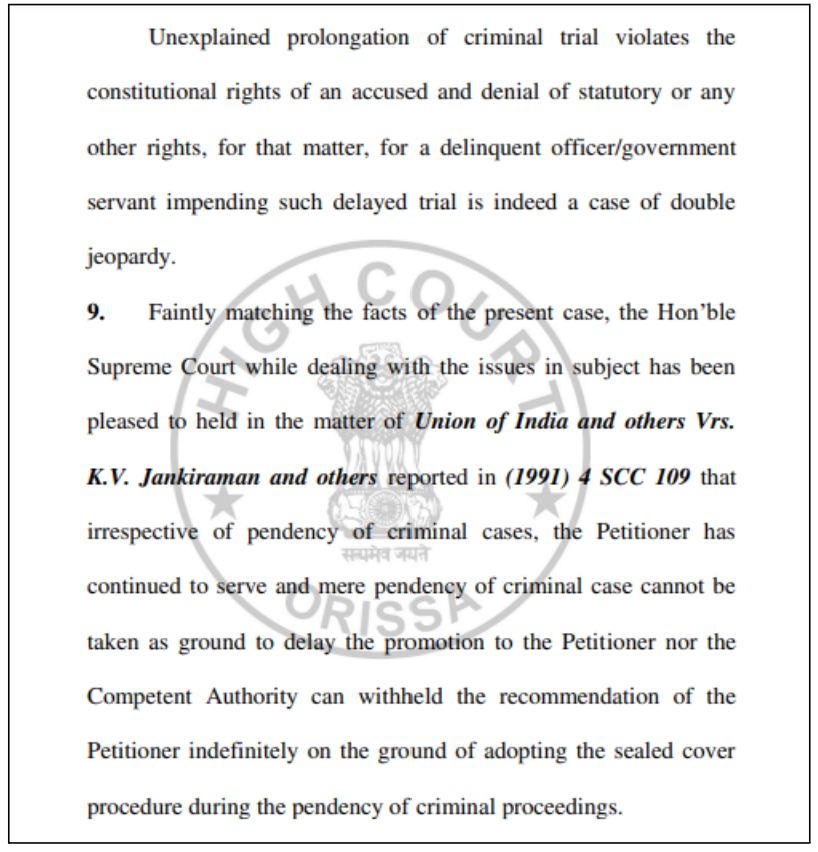
Accordingly, the court instructed the respondent authorities to promote the petitioner to the respective positions from the time their immediate juniors received promotions.


